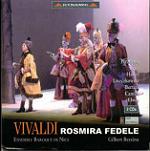First performed in January, 1738, Rosmira Fedele is among the last of Vivaldi’s dozens of operas. It is a pastiche–although he composed original music for the two leads, Rosmira and Arsace, as well as for some other numbers, he used arias by Hasse, Pergolesi, and Handel, as well as by lesser-known composers such as Mazzoni, Paganelli, Pampani, and Micheli. However, with each “borrowing” Vivaldi made alterations to suit his style: the effect is not jarring, and if we didn’t know which arias were original and which were not, it would be difficult to tell (the booklet accompanying these discs offers the information).
The plot involves mezzo Queen Partenope (the same one about whom Handel composed an opera) and her suitors, soprano Arsace and male soprano Armindo. Soprano Rosmira arrives, disguised as Eurimene; she had previously been betrothed to and abandoned by Arsace. Arsace discovers her identity, re-declares his love, but soon waffles back to his love for Partenope, promising Rosmira he will not reveal who she really is. At any rate, through a series of insults and mis-adventures Rosmira-as-Eurimene challenges Arsace to a duel on Rosmira’s behalf, since he had pledged himself to her. As the duel is about to begin, Arsace, who neither wants to fight a woman nor give away Rosmira’s true identity, insists that the duel be fought bare-chested. Ergo, Rosmira must reveal herself (how old-fashioned!), and the opera ends with Rosmira and Arsace back together, Partenope with Armindo, and a minor couple, bass Emilio (actually another one of Partenope’s suitors, but never mind) and soprano Ersilla (a Princess) rounding out the merriment. The drama, as usual in Baroque opera, is in the emotions in each aria (da capo) and in the recitatives.
The opera was a great success at its premiere. Those familiar with Vivaldi’s operas will know what to expect: an almost endless stream of da capo arias, some expressing anger, others the heartbreak of love, some using similes (I’m like a swallow that returns to its nest; a lion looks fierce when it’s hunting, you look like that when you’re in love), a couple of choruses, and a trio. All make great technical demands on the singers, and here all the singers are up to their tasks, even if none actually has what’s usually known as star quality.
The most interesting sound comes from sopranist Jacek Laszckowski as Armindo; despite occasional wildness, he’s agile and involved. Claire Brua’s Partenope is dignified and dark-hued; in her recitatives she expresses anger vividly. Marianna Pizzolato’s mezzo is very different and her Rosmira is a sensitive character, wronged but noble. Her fluency and lovely trill are a delight, and when she gets going, as in her last aria in Act 1, she’s very exciting. Salomé Heller is a fine Arsace, portraying a man torn between two women he loves, and she sings very well but never sounds masculine (the singer at the premiere also was a woman; perhaps the ruse wasn’t necessary). Well-known tenor John Elwes, in the small role of the soldier Ormonte, sounds thicker-voiced than before, but he’s rhythmically right-on-the-money.
I’m not sure about the leadership of Gilbert Bezzina; although his Baroque Ensemble de Nice plays well, it lacks the oomph of other period-instrument groups, and I’m not certain it’s their fault. There’s something matter-of-fact about the whole performance, and since the singers are so proficient, we can only assume that the guidance was not all it should have been. To my ears, this opera can’t compare with the composer’s L’Incoronazione di Doria or La verita in cimento, but as one of Vivaldi’s last works, it should be heard. It contains some wonderful music–whether entirely by Vivaldi or not. The “live” performance sound is good, applause and other intrusions aside.
































